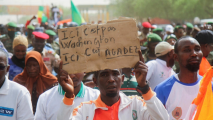Categories
Recent Posts
- Cameroon is broken: Who can fix it?
- Cameroonian beer and soft drinks exports soar by 73% and 46.6% in 2022
- Southern Cameroons Crisis: 2 teachers abducted in the North West
- World Bank says despite high potential, 75 vulnerable economies face ‘Historic Reversal’
- Cardinal Robert Sarah says Western prelates have lost their nerve
Archives
- April 2024
- March 2024
- February 2024
- January 2024
- December 2023
- November 2023
- October 2023
- September 2023
- August 2023
- July 2023
- June 2023
- May 2023
- April 2023
- March 2023
- February 2023
- January 2023
- December 2022
- November 2022
- October 2022
- September 2022
- August 2022
- July 2022
- June 2022
- May 2022
- April 2022
- March 2022
- February 2022
- January 2022
- December 2021
- November 2021
- October 2021
- September 2021
- August 2021
- July 2021
- June 2021
- May 2021
- April 2021
- March 2021
- February 2021
- January 2021
- December 2020
- November 2020
- October 2020
- September 2020
- August 2020
- July 2020
- June 2020
- May 2020
- April 2020
- March 2020
- February 2020
- January 2020
- December 2019
- November 2019
- October 2019
- September 2019
- August 2019
- July 2019
- June 2019
- May 2019
- April 2019
- March 2019
- February 2019
- January 2019
- December 2018
- November 2018
- October 2018
- September 2018
- August 2018
- July 2018
- June 2018
- May 2018
- April 2018
- March 2018
- February 2018
- January 2018
- December 2017
- November 2017
- October 2017
- September 2017
- August 2017
- July 2017
- June 2017
- May 2017
- April 2017
- March 2017
- February 2017
- January 2017
- December 2016
- November 2016
- October 2016
- September 2016
- August 2016
- July 2016
- June 2016
Featured
Most Commented Posts
 4 Anglophone detainees killed in Yaounde
4 Anglophone detainees killed in Yaounde
19 comments Chantal Biya says she will return to Cameroon if General Ivo Yenwo, Martin Belinga Eboutou and Ferdinand Ngoh Ngoh are sacked
Chantal Biya says she will return to Cameroon if General Ivo Yenwo, Martin Belinga Eboutou and Ferdinand Ngoh Ngoh are sacked
13 comments Anglophone Nationalism: Barrister Eyambe says “hidden plans are at work”
Anglophone Nationalism: Barrister Eyambe says “hidden plans are at work”
12 comments The Anglophone Problem – When Facts don’t Lie
The Anglophone Problem – When Facts don’t Lie
12 comments Largest wave of arrest by BIR in Bamenda
Largest wave of arrest by BIR in Bamenda
10 comments
Latest Tweets
Featured
-

Cameroon is broken: Who can fix it?
-

Cameroonian beer and soft drinks exports soar by 73% and 46.6% in 2022
-

Southern Cameroons Crisis: 2 teachers abducted in the North West
-

World Bank says despite high potential, 75 vulnerable economies face ‘Historic Reversal’
-

Cardinal Robert Sarah says Western prelates have lost their nerve
-

Iran launches drones at Israel in retaliatory attack
-

Thousands protest in Niger demanding immediate withdrawal of US troops
© Cameroon Concord News 2024





27, April 2019
Southern Cameroons Civilians Continue to Be Slaughtered in Midst of Clash Between Soldiers, Separatist Forces 0
Civilians in the African nation of Cameroon continue to be killed in the crosshairs of ongoing violent clashes between French-speaking government soldiers and English-speaking separatist forces seeking to form their own country.
The violence has been unceasing for the past three years in the midst of grievances that boil down to the alleged underrepresentation and squelching of those who speak English and follow British common law.
As France and Britain were allies against Germany in World War I and were granted rule of the colonies by the League of Nations, Cameroon has been a mix of both French and English-speaking inhabitants. Areas were known as French Cameroon and British Cameroon. However, following the formation of a united Republic in the 1960’s that merged both into one nation, Anglophones — those who spoke English — began sensing that although the country was considered bilingual, they were in the minority. Out of the 10 regions, eight are French and base their legal system on French law, while the other two, in western Cameroon, follow British common law.
The government also speaks French, the country’s currency is in French, and most television and radio programs are in French.
Because of this, Anglophones have felt marginalized, and the last straw seemed to be in 2016 when a business transaction law was circulated in French but not also translated into English. Lawyers in the English-speaking regions had enough of the installment of local judges who didn’t speak English well and weren’t familiar with common law.
Teachers were likewise upset about Francophones increasingly being hired in Anglophone schools. According to reports, lawyers and teachers alike took to the streets to protest the encroachment, which resulted in both arrests and violence. During one protest, government forces used live bullets and tear gas to try to break up the gathering.
Anglophones have since called for the formation of their own country, called Ambazonia, but the Cameroonian government does not wish for the nation to be divided and has sought to put down any rebellion.
Over the past three years, as clashes between English separatists and the French security forces have raged, thousands of residents have fled for their lives into other regions or to the neighboring nation of Nigeria. Reports of innocent civilians being killed have regularly been in the headlines, and both sides have been blamed for the violence.
“People are dying everywhere,” Pamela Njoke told the New York Times. “In short, it’s horrible.”
“Armed separatists in Cameroon’s Anglophone regions have stabbed to death and shot military personnel, burned down schools and attacked teachers, while security forces have tortured people, fired on crowds and destroyed villages, in a spiral of violence that keeps getting more deadly,” wrote Amnesty International in June.
It explained that video footage obtained by the organization showed military forces burning down the village of Kwakwa, while residents in other areas have allegedly been detained and tortured in an effort to get them to confess that they supported the separatists.
However, those who do not cooperate with the efforts of the Ambazonia Liberation Forces, or who are even suspected of supporting the government, are reportedly also vulnerable to violence and unmerited attack by the separatists. A number of schools have been set on fire or principals abducted, and some students or teachers have even been shot.
“The assailant … told me that I was still coming to school in defiance of calls for a schools boycott. … He then asked me to raise my hands, but before I could do so, he shot me,” one teacher told Amnesty International.
A report published by AFP earlier this month says that five civilians were shot and killed by security forces in an English-speaking village, with one beheaded.
“Three of the bodies were later discovered mutilated, including two found with their hands tied and their genitals cut off,” the outlet states.
One woman was also killed at a local hospital and another wounded while government soldiers searched for separatists.
“[S]ecurity forces allegedly shot and killed over a dozen civilians, including at least seven people whom witnesses said had intellectual, psychosocial or physical disabilities who did not flee because they were unable or refused to. At least four older women died, burned alive, after security forces set their homes on fire,” Human Rights Watch similarly wrote in its 2019 report.
In September, The Guardian published an article stating that “[a] self-declared member of the Ambazonia Liberation Forces appeared in a … video alongside images of a soldier’s decapitated head …”
President Paul Biya urged separatists last year to cease the fighting or they will be “neutralized.”
“If my appeal to warmongers to lay down their weapons remains unheeded, the Defense and Security Forces will be instructed to neutralize them,” he said, according to Journal Du Cameroun. “I am well aware of the distress these rebels are causing the populations of these regions. This situation cannot be allowed to continue.”
However, some have stated that the government’s equally violent response has not helped to bring peace.
“People in Cameroon’s Anglophone regions are in the grip of a deadly cycle of violence. Security forces have indiscriminately killed, arrested and tortured people during military operations which have also displaced thousands of civilians. Their heavy-handed response will do nothing to calm the violence. In fact, it is likely to further alienate Anglophone communities and fuel further unrest,” Samira Daoud, Amnesty International Deputy Director for West and Central Africa, said in statement.
More than 500 civilians have been killed as a result of the three-year clash, as well as over 200 government soldiers, and an estimated 400,000 to 500,000 residents displaced. The European Union has spoken out against the violence and has called for dialogue between the two sides.
“Regrettably, unlawful killings and atrocities continue to be reported regularly in the regions, allegedly involving both the security and defense forces and separatist groups,” one representative recently lamented before the EU parliament.
Source: Christian News